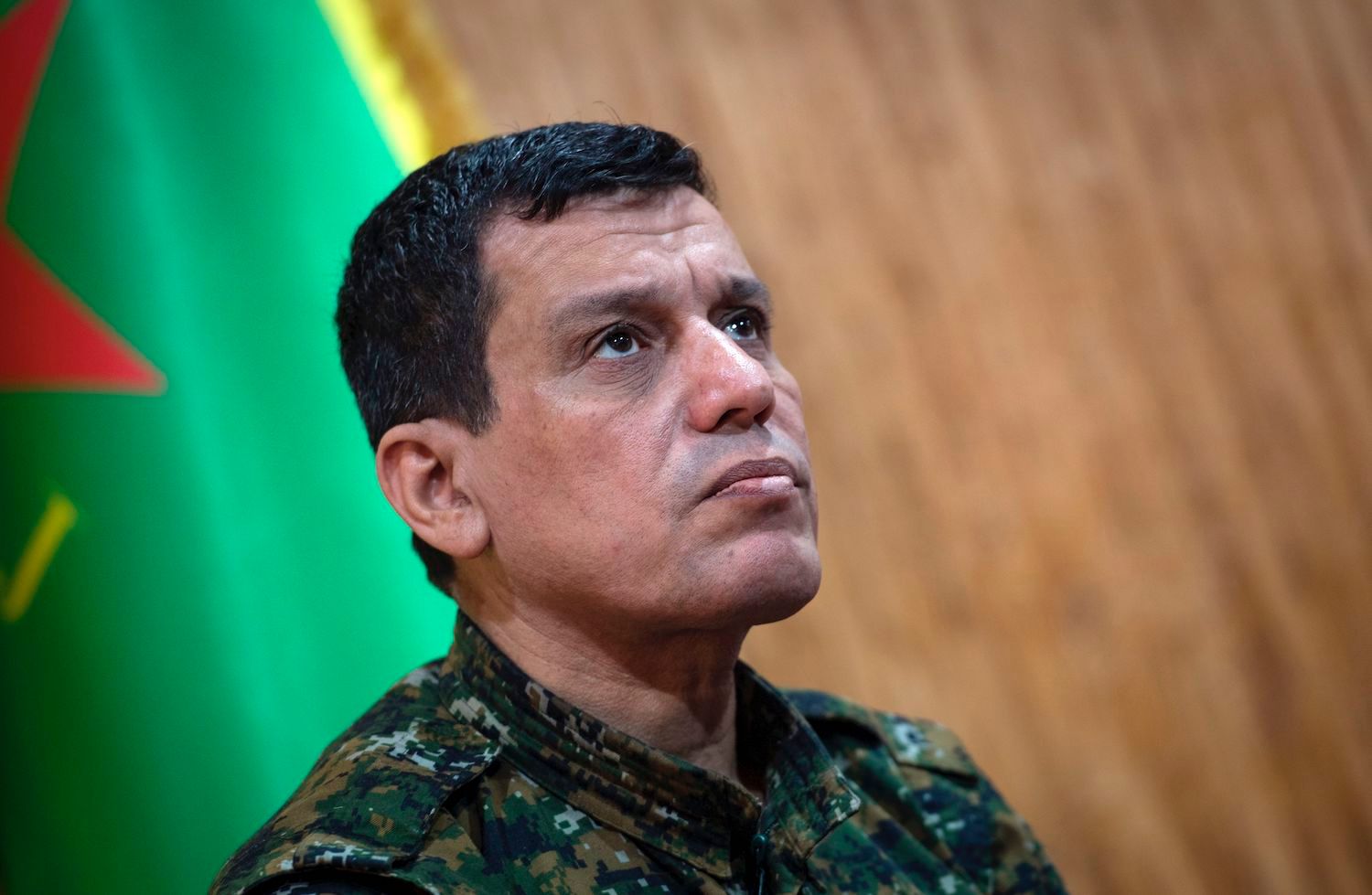The SDF’s Gen. Mazloum Abdi wants international observers to stop Turkish-backed forces from displacing the Kurds.
Gen. Mazloum Abdi, the commander of the Kurdish-led Syrian Democratic Forces (SDF), has a message for U.S. President Donald Trump: The United States must act now to bring Turkey in line with the terms of the U.S.-brokered cease-fire agreement and stop Ankara’s campaign to drive the vulnerable Kurdish minority out of Syria.
In an interview with Foreign Policy, Abdi called on Trump to enforce the Oct. 17 agreement negotiated by U.S. Vice President Mike Pence to end Turkey’s violent incursion into northeastern Syria that began Oct. 9. In particular, the Turks are violating the condition that both sides would safeguard religious and ethnic minorities inside the 20-mile zone Turkey seized from the Kurdish forces, Abdi said.
“Mr. President … the Turks are doing ethnic cleansing inside this area as they did in Afrin,” Abdi said, referring to Turkey’s bloody 2018 invasion of the majority-Kurdish Afrin district in northwestern Syria. “America should not allow forced changes in demography and ethnic cleansing in the 21stcentury.”
The commander, who indicated he may travel to Washington in the near future, called on Trump and the United Nations to send international observers to the 20-mile zone as a guarantee to the displaced Kurdish population.
U.S. officials have discussed the refugee crisis “extensively” with their Turkish counterparts and have also urged “all actors operating in northeast Syria to refrain from any action that could lead to a change in the demographic structures,” a State Department official told Foreign Policy.
“One of our primary goals in northeast Syria is to call for the safety of the civilian populations living in these areas,” the official said.
Since Turkish President Recep Tayyip Erdogan’s army and proxy forces swept into northeastern Syria in October, the Turkish-backed Free Syrian Army—a loose group of Syrian rebels founded by defectors from Syrian President Bashar al-Assad’s army—has terrorized the local population. Although a series of cease-fire agreements have halted the large-scale assault, there are regular reports of atrocities at the hands of the force, including regular arrests, looting, and executions. Abdi recently met with a group of local residents who said the Turkish-backed fighters seized their property and forced them to flee.
The Turkish proxies—whom Abdi calls “jihadis,” a reference to the proxies’ ties to extremist groups—are committing a form of ethnic cleansing in the area, the Kurdish commander said, arresting and killing any Kurds who try to return. Further, the Turkish-backed Free Syrian Army is threatening displaced residents—calling their personal cell phones and making announcements in mosques across the region, telling them that if they return, they will be beheaded and killed. Anyone affiliated with the SDF or its political arm, the Syrian Democratic Council, faces the same threat.
“People who are afraid don’t attempt to come back,” Abdi said. “The Turks and their jihadis plan to kick out all the Kurds from Syria.”
Local media reports, Syrian sources, and information provided independently to Foreign Policy by the northeastern Syria-based Rojava Information Center back up Abdi’s account of the situation on the ground.
Of the roughly 200,000 people displaced by the Turkish operation, roughly 120,000 have returned to their homes, according to the United Nations. But the U.N. has limited visibility into the region due to the ongoing conflict, and local reports indicate the number could be much smaller.
According to information provided to Foreign Policy by the SDF, as of Dec. 16 the operation has killed 478 civilians and wounded 1,070, as well as disrupting health and education services. Turkish forces also targeted the main water station and cut off the major M4 highway, preventing crucial humanitarian aid from reaching displaced residents. More than 500,000 citizens are at risk of thirst and diseases caused by water pollution in Hasakah, just south of the Turkish-Syrian border, and its countryside.
Even as his proxies force the Kurds to flee, Erdogan has begun replacing them with refugees from elsewhere in Syria. Hundreds of Syrian refugees have been quietly flowing across the Turkish border into northeastern Syria in recent weeks, primarily the Arab and Turkmen families of the Turkish-backed fighters. Erdogan has vowed to resettle roughly 3 million Syrian refugees currently living in Syria to formerly Kurdish-held territory, a scenario that experts warn could prompt a new humanitarian catastrophe.
Turkey says a convoy of roughly 600 families that crossed the border on Nov. 24 was made up of people from the Kurdish-held region, but locals say the refugees are from elsewhere in Syria—Deir Ezzor, Raqqa, and farther afield areas such as Idlib, Ghouta, Homs, and even Iraq.
There is also a continued threat from the Islamic State, which used the chaos caused by the Turkish invasion to regroup and mount attacks, Abdi said. The SDF believes there are at least 146 ex-Islamic State fighters in the area the Turks now occupy—and the Turks have not made any efforts to rout them out.
The SDF leader called on the United States and Russia—which brokered a separate cease-fire agreement with Turkey days after Pence visited Ankara—to do more to prevent Turkey from killing Kurdish residents and other minorities. Abdi warned of a repeat of Turkey’s operation in Afrin, which has displaced around 300,000 Kurds and massacred hundreds of civilians to date.
“This is the responsibility of the guarantors of both agreements, the Russians and the Americans,” Abdi said. “They should claim their role in stopping those actions and make the Turks abide by the agreement … their efforts are not sufficient.”

